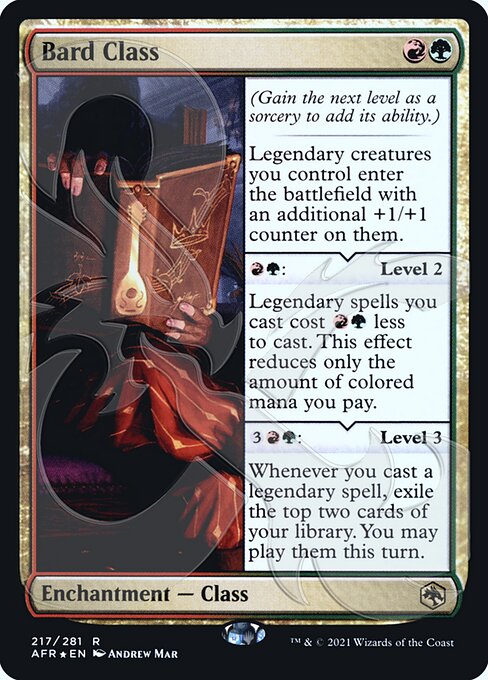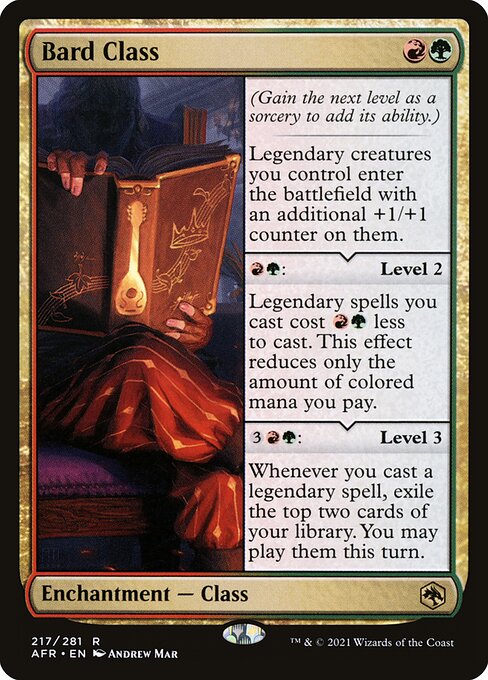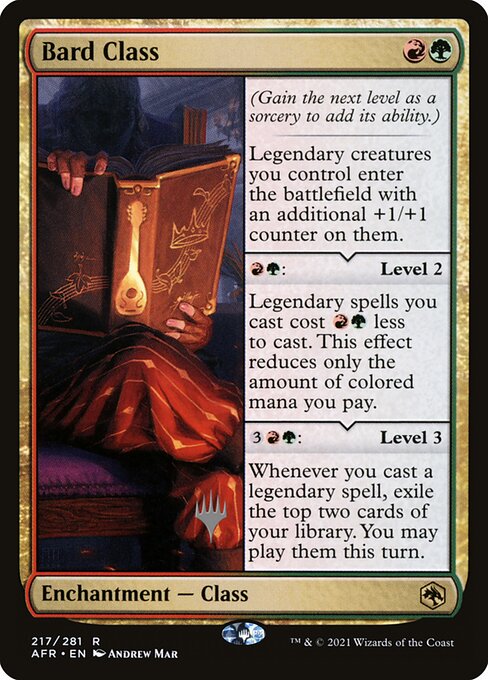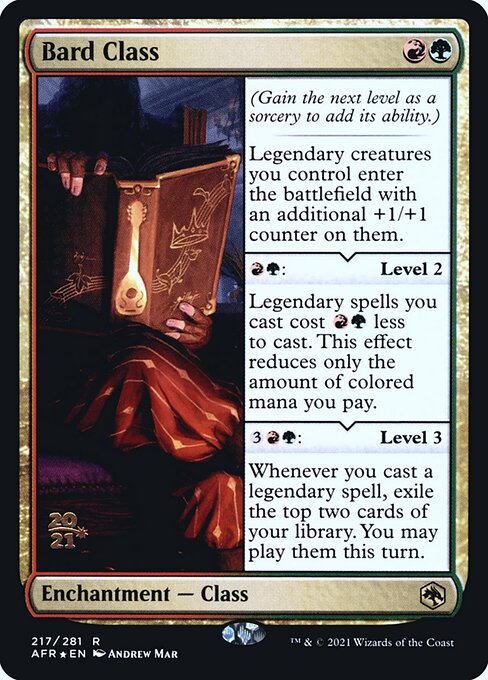Bard Class
Enchantment — Class
(Gain the next level as a sorcery to add its ability.)
Legendary creatures you control enter the battlefield with an additional +1/+1 counter on them.
: Level 2
Legendary spells you cast cost less to cast. This effect reduces only the amount of colored mana you pay.
: Level 3
Whenever you cast a legendary spell, exile the top two cards of your library. You may play them this turn.
Legendary creatures you control enter the battlefield with an additional +1/+1 counter on them.
: Level 2
Legendary spells you cast cost less to cast. This effect reduces only the amount of colored mana you pay.
: Level 3
Whenever you cast a legendary spell, exile the top two cards of your library. You may play them this turn.
standard
future
historic
gladiator
pioneer
explorer
modern
legacy
pauper
vintage
penny
commander
brawl
alchemy
paupercommander
duel
oldschool
premodern
Rulings
If you exile a modal double-faced card this way, you may cast either face of that card.
Gaining a level is a normal activated ability. It uses the stack and can be responded to.
You can multiclass or even control multiple Class enchantments of the same class. Each Class permanent tracks its own level separately.
Gaining a level won't remove abilities that a Class had at a previous level.
Each Class has five abilities. The three in the major sections of its text box are class abilities. Class abilities can be static, activated, or triggered abilities. The other two are level abilities, one activated ability to advance the Class to level 2 and another to advance the Class to level 3.
Some Class cards have an effect that increases when more are under your control. For example, if you have multiple Barbarian Class cards, you roll that many additional dice and ignore that many of the lowest rolls.
Each Class starts with only the first of three class abilities. As the first level ability resolves, the Class becomes level 2 and gains the second class ability. As the second level ability resolves, the Class becomes level 3 and gains the third class ability.
Unlike most abilities that reduce the costs of spells, Bard Class's Level 2 ability cannot be applied to generic mana costs. For example, a spell that costs to cast would instead cost to cast.
You can't activate the first level ability of a Class unless that Class is level 1. Similarly, you can't activate the second level ability of a Class unless that Class is level 2.
If you control multiple Bard Classes, legendary creatures you control enter the battlefield with that many additional +1/+1 counters.
If you do not play the cards exiled with Bard Classes Level 3 ability on the turn they are exiled, they will remain exiled indefinitely and cannot be played on a later turn.
Gaining a level is a normal activated ability. It uses the stack and can be responded to.
You can multiclass or even control multiple Class enchantments of the same class. Each Class permanent tracks its own level separately.
Gaining a level won't remove abilities that a Class had at a previous level.
Each Class has five abilities. The three in the major sections of its text box are class abilities. Class abilities can be static, activated, or triggered abilities. The other two are level abilities, one activated ability to advance the Class to level 2 and another to advance the Class to level 3.
Some Class cards have an effect that increases when more are under your control. For example, if you have multiple Barbarian Class cards, you roll that many additional dice and ignore that many of the lowest rolls.
Each Class starts with only the first of three class abilities. As the first level ability resolves, the Class becomes level 2 and gains the second class ability. As the second level ability resolves, the Class becomes level 3 and gains the third class ability.
Unlike most abilities that reduce the costs of spells, Bard Class's Level 2 ability cannot be applied to generic mana costs. For example, a spell that costs to cast would instead cost to cast.
You can't activate the first level ability of a Class unless that Class is level 1. Similarly, you can't activate the second level ability of a Class unless that Class is level 2.
If you control multiple Bard Classes, legendary creatures you control enter the battlefield with that many additional +1/+1 counters.
If you do not play the cards exiled with Bard Classes Level 3 ability on the turn they are exiled, they will remain exiled indefinitely and cannot be played on a later turn.
Rulings
If you exile a modal double-faced card this way, you may cast either face of that card.
Gaining a level is a normal activated ability. It uses the stack and can be responded to.
You can multiclass or even control multiple Class enchantments of the same class. Each Class permanent tracks its own level separately.
Gaining a level won't remove abilities that a Class had at a previous level.
Each Class has five abilities. The three in the major sections of its text box are class abilities. Class abilities can be static, activated, or triggered abilities. The other two are level abilities, one activated ability to advance the Class to level 2 and another to advance the Class to level 3.
Some Class cards have an effect that increases when more are under your control. For example, if you have multiple Barbarian Class cards, you roll that many additional dice and ignore that many of the lowest rolls.
Each Class starts with only the first of three class abilities. As the first level ability resolves, the Class becomes level 2 and gains the second class ability. As the second level ability resolves, the Class becomes level 3 and gains the third class ability.
Unlike most abilities that reduce the costs of spells, Bard Class's Level 2 ability cannot be applied to generic mana costs. For example, a spell that costs to cast would instead cost to cast.
You can't activate the first level ability of a Class unless that Class is level 1. Similarly, you can't activate the second level ability of a Class unless that Class is level 2.
If you control multiple Bard Classes, legendary creatures you control enter the battlefield with that many additional +1/+1 counters.
If you do not play the cards exiled with Bard Classes Level 3 ability on the turn they are exiled, they will remain exiled indefinitely and cannot be played on a later turn.
Gaining a level is a normal activated ability. It uses the stack and can be responded to.
You can multiclass or even control multiple Class enchantments of the same class. Each Class permanent tracks its own level separately.
Gaining a level won't remove abilities that a Class had at a previous level.
Each Class has five abilities. The three in the major sections of its text box are class abilities. Class abilities can be static, activated, or triggered abilities. The other two are level abilities, one activated ability to advance the Class to level 2 and another to advance the Class to level 3.
Some Class cards have an effect that increases when more are under your control. For example, if you have multiple Barbarian Class cards, you roll that many additional dice and ignore that many of the lowest rolls.
Each Class starts with only the first of three class abilities. As the first level ability resolves, the Class becomes level 2 and gains the second class ability. As the second level ability resolves, the Class becomes level 3 and gains the third class ability.
Unlike most abilities that reduce the costs of spells, Bard Class's Level 2 ability cannot be applied to generic mana costs. For example, a spell that costs to cast would instead cost to cast.
You can't activate the first level ability of a Class unless that Class is level 1. Similarly, you can't activate the second level ability of a Class unless that Class is level 2.
If you control multiple Bard Classes, legendary creatures you control enter the battlefield with that many additional +1/+1 counters.
If you do not play the cards exiled with Bard Classes Level 3 ability on the turn they are exiled, they will remain exiled indefinitely and cannot be played on a later turn.
Votre collection ? vos decks ?
Envie de gérer votre collection et/ou créer des decks ?



 0
0
 0.74€
0.74€

